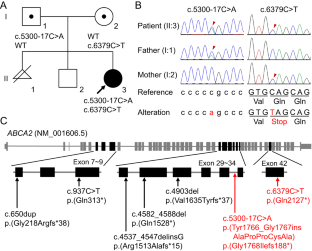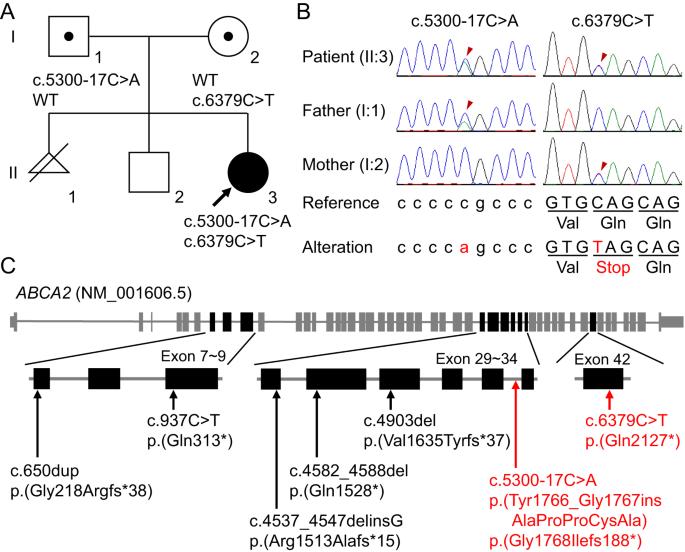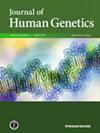新型复合杂合ABCA2变体会导致IDPOGSA,这是一种表型多变的智障综合征。
IF 2.6
3区 生物学
Q2 GENETICS & HEREDITY
引用次数: 0
摘要
ATP 结合盒亚族 A 成员 2(ABCA2)的基因位于染色体 9q34.3。ABCA2双倍变体会导致智力发育障碍,表现为生长发育不良,伴有或不伴有癫痫发作或共济失调(IDPOGSA)。在本研究中,我们通过全外显子测序在一名 28 岁的韩国女性智力障碍患者中发现了新型复合杂合 ABCA2 变异(NM_001606.5:c. [5300-17C>A];[6379C>T])。这些变异包括分别来自父源和母源的内含变异和无义变异,在 gnomAD 中并不存在。SpliceAI 预测内含子变异会产生一个隐性接受位点。利用从患者的淋巴母细胞系提取的 RNA 进行反转录-PCR,证实了两个异常转录本。她的临床特征与 IDPOGSA 患者相符。本文章由计算机程序翻译,如有差异,请以英文原文为准。


Novel compound heterozygous ABCA2 variants cause IDPOGSA, a variable phenotypic syndrome with intellectual disability
The gene for ATP binding cassette subfamily A member 2 (ABCA2) is located at chromosome 9q34.3. Biallelic ABCA2 variants lead to intellectual developmental disorder with poor growth and with or without seizures or ataxia (IDPOGSA). In this study, we identified novel compound heterozygous ABCA2 variants (NM_001606.5:c.[5300–17C>A];[6379C>T]) by whole exome sequencing in a 28-year-old Korean female patient with intellectual disability. These variants included intronic and nonsense variants of paternal and maternal origin, respectively, and are absent from gnomAD. SpliceAI predicted that the intron variant creates a cryptic acceptor site. Reverse transcription-PCR using RNA extracted from a lymphoblastoid cell line of the patient confirmed two aberrant transcripts. Her clinical features are compatible with those of IDPOGSA.
求助全文
通过发布文献求助,成功后即可免费获取论文全文。
去求助
来源期刊

Journal of Human Genetics
生物-遗传学
CiteScore
7.20
自引率
0.00%
发文量
101
审稿时长
4-8 weeks
期刊介绍:
The Journal of Human Genetics is an international journal publishing articles on human genetics, including medical genetics and human genome analysis. It covers all aspects of human genetics, including molecular genetics, clinical genetics, behavioral genetics, immunogenetics, pharmacogenomics, population genetics, functional genomics, epigenetics, genetic counseling and gene therapy.
Articles on the following areas are especially welcome: genetic factors of monogenic and complex disorders, genome-wide association studies, genetic epidemiology, cancer genetics, personal genomics, genotype-phenotype relationships and genome diversity.
 求助内容:
求助内容: 应助结果提醒方式:
应助结果提醒方式:


